Instructions for treating raspberries in summer against diseases and pests
Processing raspberries is a mandatory procedure. Many people mistakenly believe that this is only required to protect against diseases and pests. This is not true: processing is needed to improve the taste of the berries, increase yield, and prepare the plant for winter. Properly selected products will strengthen the immunity of raspberries, which will give summer residents tasty and large fruits. How to treat raspberries against pests and what means to use to increase productivity, we will consider in the article.
What treatment does raspberries require in summer?
Raspberries are processed throughout the summer. In June, the shrub enters the stage of active growth and requires treatments to stimulate fruiting. In July, the fruits begin to ripen - gardeners focus on biological and chemical preparations.
In August, raspberries are prepared for the winter season - they are treated with folk or purchased remedies. Also during the summer, summer residents regularly carry out preventive and protective measures against diseases and insect pests. Spray young and adult shrubs once every 2-3 weeks.
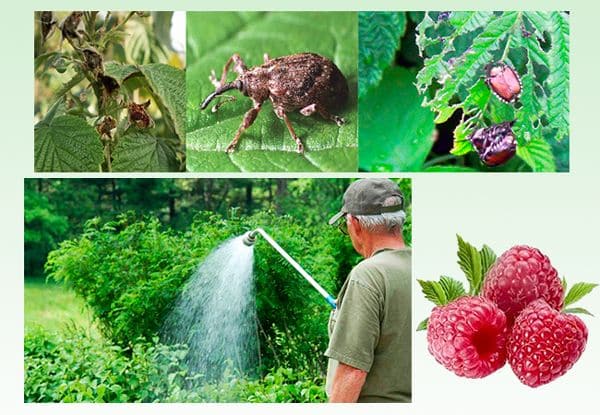
Time limits for different types of processing
In order for the measures to have a positive effect, it is recommended to comply with the processing time. Otherwise, the procedure will not give the expected result.
Treatments required for fruiting
Such treatments are carried out from late spring to early summer. The exact timing depends on the raspberry variety. There are early, middle, late ripening. Experienced gardeners recommend spraying plants before June 15.Most varieties begin to set fruit at this time. Correctly selected preparations stimulate the development of berries, affect their taste and presentation.
Attention! When choosing a date for the procedure, you can use the lunar calendar. In 2020 it is June 21-23. These days create favorable natural rhythms for caring for garden shrubs.
During fruiting
Ordinary and remontant varieties produce a harvest in the second year after planting. Fruiting is affected by the quality and composition of the soil, natural conditions, external factors and proximity to other plants. To strengthen the immunity of raspberries, treatments are used from late June to mid-July. Thanks to them, the berries grow large and sweet, and the yield increases.
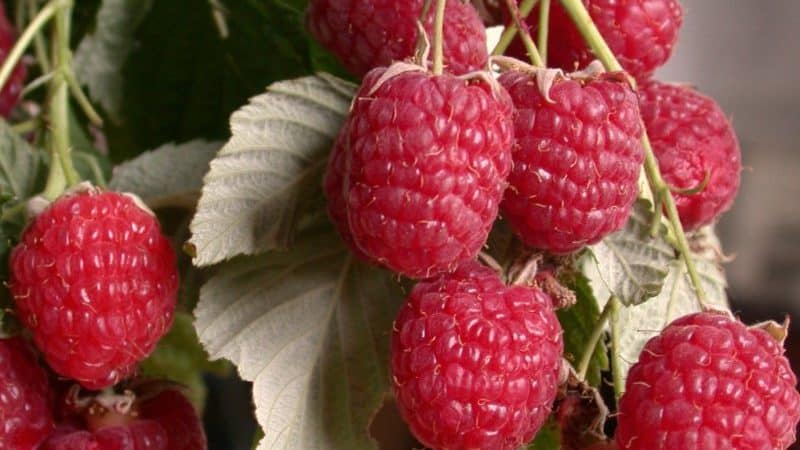
After harvest
Fruiting of most varieties ends in August, after which gardeners begin processing. They use folk or chemical remedies - they protect the raspberries from diseases and pests, restore metabolic processes and prepare them for wintering.
To ensure that the drugs are better absorbed, it is recommended before the procedure. trim old and dry shoots. Excessive branches take away important nutrients from the shrub, causing the plant to weaken and wither.
Attention! Dry and windless days are chosen for processing. The optimal time is early morning or evening, when there is no sun. If you spray a raspberry tree in hot and sunny weather, burns will appear on the leaves, shoots and fruits.
How to process raspberries in June
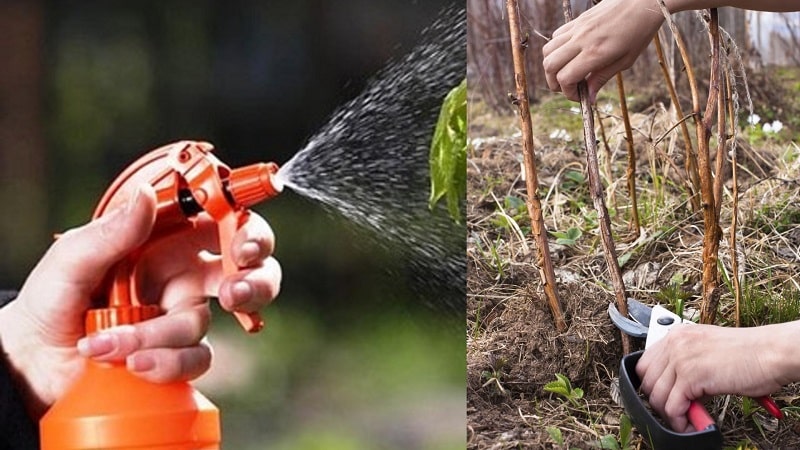
Gardeners choose organic products for processing in June. The liquid extract “Biohumus Eco-Magic” is effective in use. Spraying improves root formation and stimulates fruit set. The product contains nitrogen, phosphorus, potassium, humic acids.Among the advantages are the affordable price (about 200 rubles for 5 liters), ease of preparation and ease of processing. The hood is used for spraying young and adult plants. To prepare the working solution, 10 liters of water and 10 caps of the drug are required. The product is used immediately; it is not suitable for storage.
In June, “Special Crystal” is used. The fertilizer is complex, easily soluble, and does not contain chlorine harmful to raspberries. “Kristalon” improves fruit set, increases the shrub’s resistance to frost and increases productivity. The drug contains nitrogen, potassium, sulfur, magnesium. To prepare, dilute 30 g of the substance in 10 liters of water. Spray the raspberries early in the morning.
In July
To increase yields in July, treatment with yeast infusion is used.
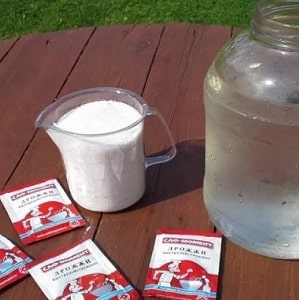
It’s easy to prepare: dissolve 100 g of fresh yeast and 100 g of sugar in 5 liters of warm water and leave for 3 days.
Every day, the solution is thoroughly mixed with a wooden stick so that the yeast dissolves. Afterwards it is diluted with clean water in a ratio of 1:10.
The resulting liquid is poured into a clean spray bottle and the bushes are sprayed from all sides. One adult plant requires about 4 liters, a young plant - up to 2 liters.
Attention! Before the procedure, it is recommended to clear the soil of weeds and fallen leaves, remove young shoots from the bushes, and loosen the soil to a depth of no more than 5 cm. Thanks to these simple actions, raspberries will better absorb nutrients.
Fertilizing with Folirus Calcium-Magnesium, a liquid concentrated mineral fertilizer, is indispensable in July. It increases the resistance of raspberries to external factors, improves metabolism, and stimulates the development of shoots.
100 ml of the drug is diluted in 5 liters of warm water and sprayed on raspberries.This treatment is especially necessary for shrubs with a deficiency of mineral elements.
In August
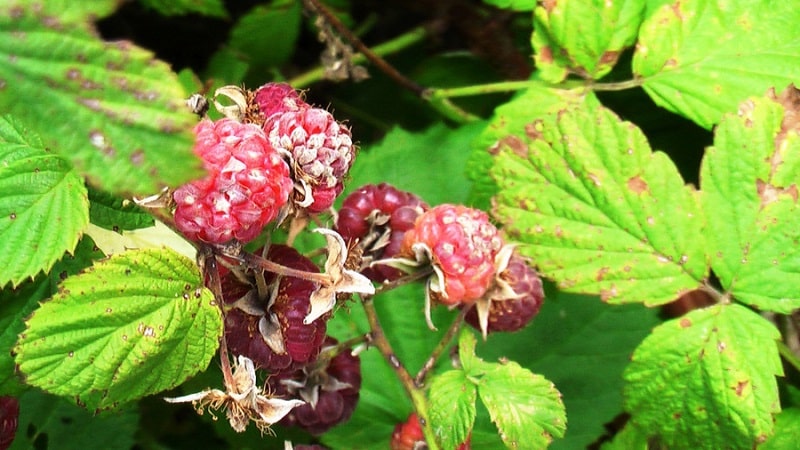
In August and autumn, raspberries are treated with a solution based on potassium humate. This is a mineral-organic fertilizer based on humic acids. Treatment helps the plant cope with stress after harvesting fruits, protects it from sudden changes in weather and other unfavorable factors. Potassium humate improves soil microflora and makes it more nutritious. For foliar feeding 60 ml of the drug is dissolved in 10 liters of water. Potassium humate is sold in garden stores, the price for 3 liters is about 200 rubles.
Summer residents also use liquid complex fertilizer “Aquarin fruit and berry”. In addition to nitrogen and potassium, the drug contains magnesium, zinc, and iron. 25 ml of fertilizer is diluted in 10 liters of water, per 1 square meter. m takes about 1 liter of working solution. “Aquarin” is quickly absorbed by the plant, is not washed out by water, and improves the appearance of berry bushes.
Treatments for diseases
Diseases appear during any period of the growing season - during flowering, fruiting, and harvesting. Most often the reason lies in improper care, high humidity, contaminated soil. Sometimes the development of diseases is provoked by dense plantings and a lack of microelements.
Means of struggle:
- A solution is used against anthracnose and powdery mildew copper sulfate. The fungicide replenishes copper deficiency and heals damage, therefore it is used as a therapeutic and prophylactic agent. 100 g of copper sulfate is dissolved in 10 liters of water and mixed. It is not recommended to use the product more than 2 times during the summer.
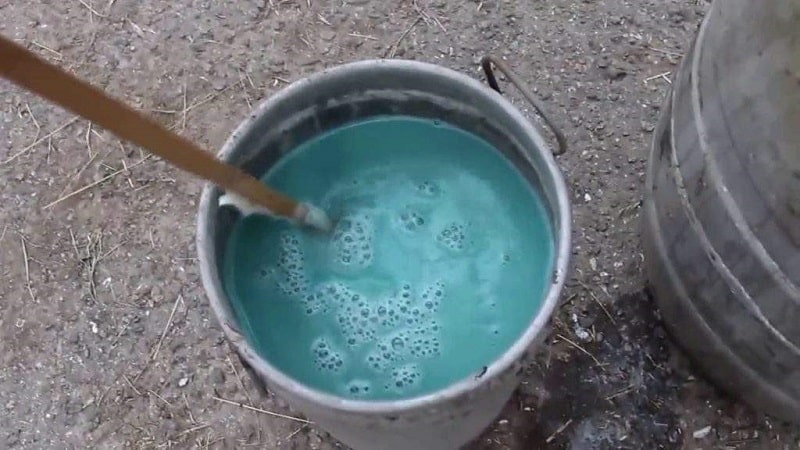
- A solution of iron sulfate is used to get rid of chlorosis, mosses and lichens. The drug restores metabolism and replenishes iron deficiency.To prepare a 3% solution, use 10 liters of water and 300 g of the substance. The drug also helps to cope with insect pests.
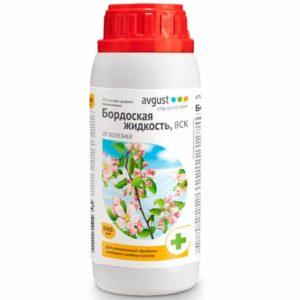 Bordeaux mixture is a universal drug that destroys fungal, viral and bacterial diseases. To prepare a 1% solution, use 10 liters of water, 100 g of copper sulfate and 150 g of lime. No more than 3 treatments are carried out per season.
Bordeaux mixture is a universal drug that destroys fungal, viral and bacterial diseases. To prepare a 1% solution, use 10 liters of water, 100 g of copper sulfate and 150 g of lime. No more than 3 treatments are carried out per season.
From pests
Folk remedies are effective against raspberry beetles, aphids and gall midges.
Gardeners soak 400 g of dried marigolds in 20 liters of hot water and leave for 2 days.
The solution is filtered and poured into a spray bottle. One bush takes about 7 liters. This method is also used to prevent the appearance of insect pests.
The professional drug “Agravertin” is used against weevils, bud moths and stem flies. The working solution is prepared before treatment and used within 2 hours.
One ampoule of “Agravertine” (5 ml) is dissolved in 10 liters of water. The drug is non-addictive and harmless to fetuses, so there are no restrictions on its use. It takes about 2 liters for a bush.
How to spray raspberries
Experienced gardeners recommend alternating treatments with purchased and folk remedies. It is important to prepare solutions in accordance with the indicated dosages.
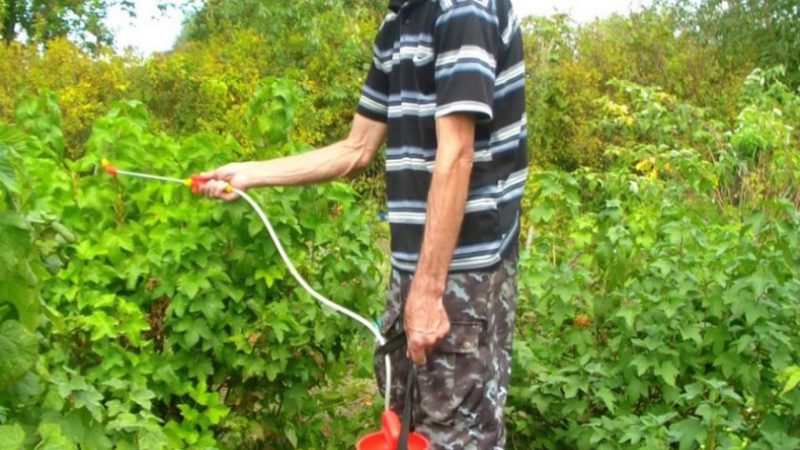
Ready-made purchased formulations
Ready-made formulations are good because they already contain a balanced composition of microelements. Such preparations are simply diluted with water; there is no need to measure the dosages of different substances.
To process raspberries use:
- "Ideal". Universal liquid feeding increases the yield and resistance of raspberries to diseases. Suitable for plants of any age and varieties (ordinary and remontant). It is not addictive and is quickly absorbed.
- "Super Harvest" Complex fertilizer based on peat and vermicompost improves the taste of fruits. They grow large, juicy and sweet. Fertilizer serves as a preventative against insects and strengthens the immunity of weakened shrubs.
- "Fasco" for berry bushes increases productivity and accelerates ripening time. Contains a complex of microelements, suitable for processing at any time during the growing season.
Folk recipes
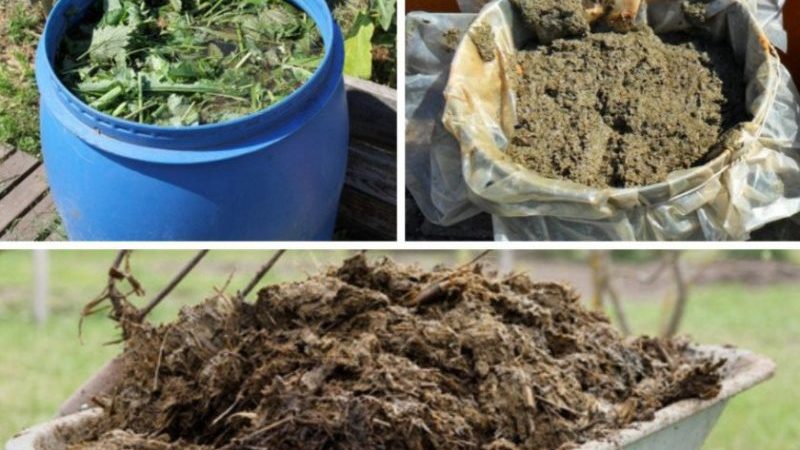
An infusion of weeds and manure is used to process raspberries.. Place 10 liters of manure and 5 kg of chopped weeds in a 50-liter barrel, leave for 5 days, and dilute with water in a ratio of 1:10. Before processing, the bush is watered abundantly. It is recommended to prepare the solution in a plastic barrel, since it will oxidize in an iron barrel.
Attention! A favorite remedy for summer residents is ash solution. Pour 250 g of dry wood into 5 liters of water. ash. Infuse for 2 days and filter. If desired, add 2 tbsp to the solution. l. liquid soap is effective against aphids and caterpillars. During the summer, the ash solution is used 2-3 times.
How to properly process raspberries
To ensure that processing raspberries in the summer is beneficial, summer residents prepare for the procedure in advance. To prepare solutions, use clean containers, previously disinfected with a solution of potassium permanganate.
The water must be clean, without foreign impurities. It is convenient to use a spray bottle; it is thoroughly washed, the pressure is checked and only then the liquid is poured into it. If you buy ready-made treatment products, check their expiration date and carefully study the recommended dosages.
Processing instructions
After all the preparations, the gardeners begin the procedure. Instructions for processing raspberries look like this: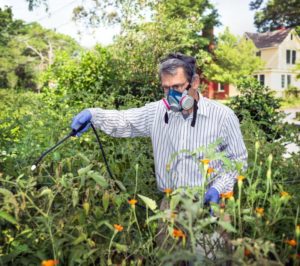
- Wear personal protective equipment - goggles, gloves, respirator (if chemicals are used).
- Spray the shoots and leaves from all sides, carefully lifting the lower part of the bush.
- Treat the mulch layer and soil under the bushes to remove pest larvae and fungal spores.
- Check to see if the solution has reached all parts of the plant.
- Pour out the remaining product, rinse the container and spray bottle, and remove the protection.
Advice from experienced gardeners
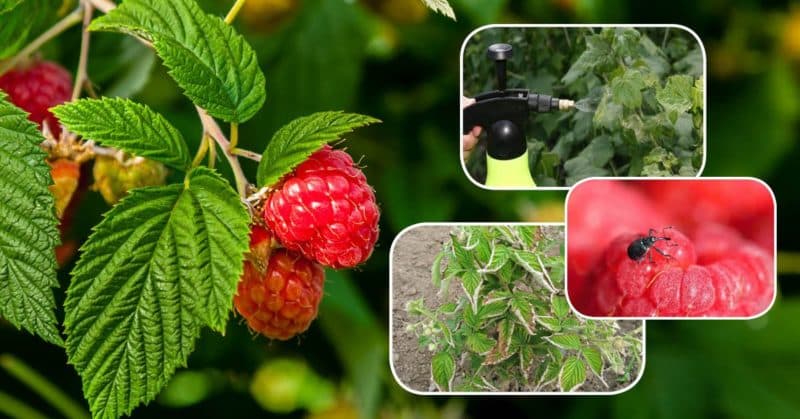
Experienced summer residents recommend regularly inspecting raspberry bushes for diseases and pests and, if they are found, immediately begin processing. At each stage, gardeners use products with different active ingredients. For example, the drug Fitosporin is used for treatment, and ash or yeast solution is used for prevention. You cannot spray shrubs in the rain - the water will wash away the product, and there will be no effect from such a procedure.
Attention! If the raspberry is attacked by a raspberry beetle, before the procedure the bushes are shaken so that the insects are on the ground, and only then the processing begins. The beetles are collected by hand and burned in a pile with garbage.
Experienced gardeners do not recommend treating bushes more than once every 2 weeks. Excess spraying is just as harmful to the plant as too little. A suitable interval between procedures is 2-3 weeks.
Conclusion
Regular and balanced processing of raspberries guarantees strong immunity, good yield, protection from diseases and insect pests. Spray the bushes in the morning or evening in dry weather. When using chemical compounds, prepare personal protective equipment.
Depending on the purpose of the procedure, summer residents use a solution of copper or iron sulfate, yeast or wood ash, and the preparations “Aquarin”, “Ideal”, “Super Harvest”. It is recommended to alternate them with each other, following the preparation instructions and dosage.